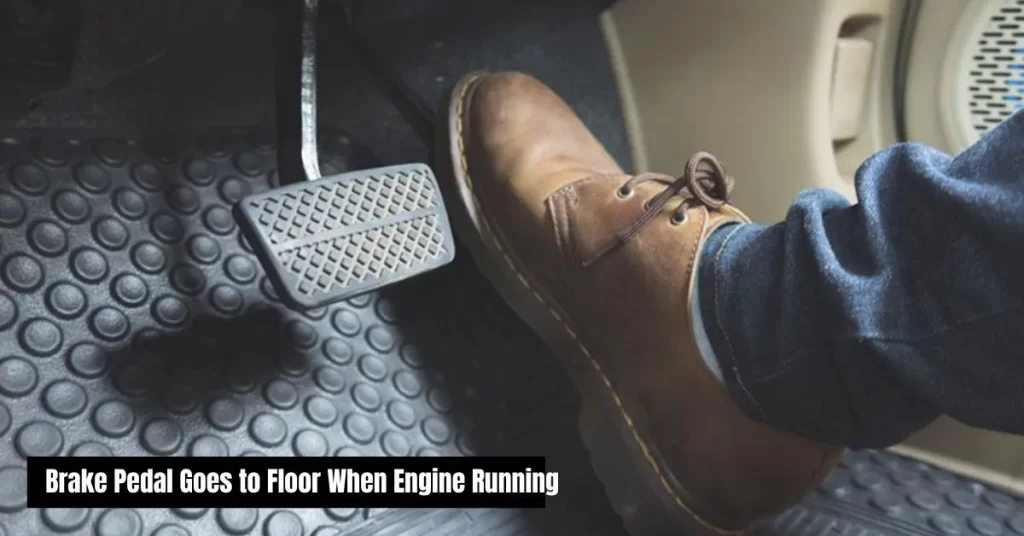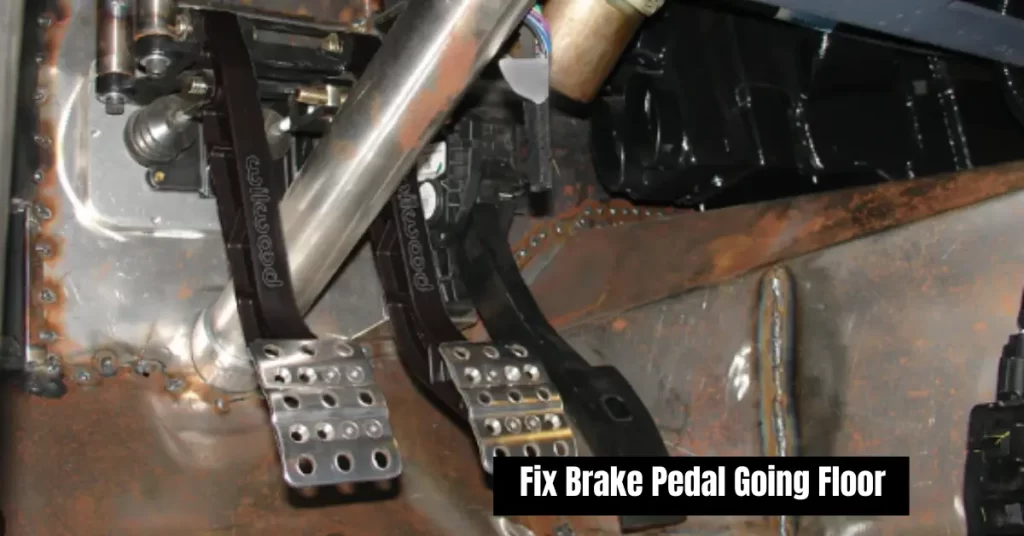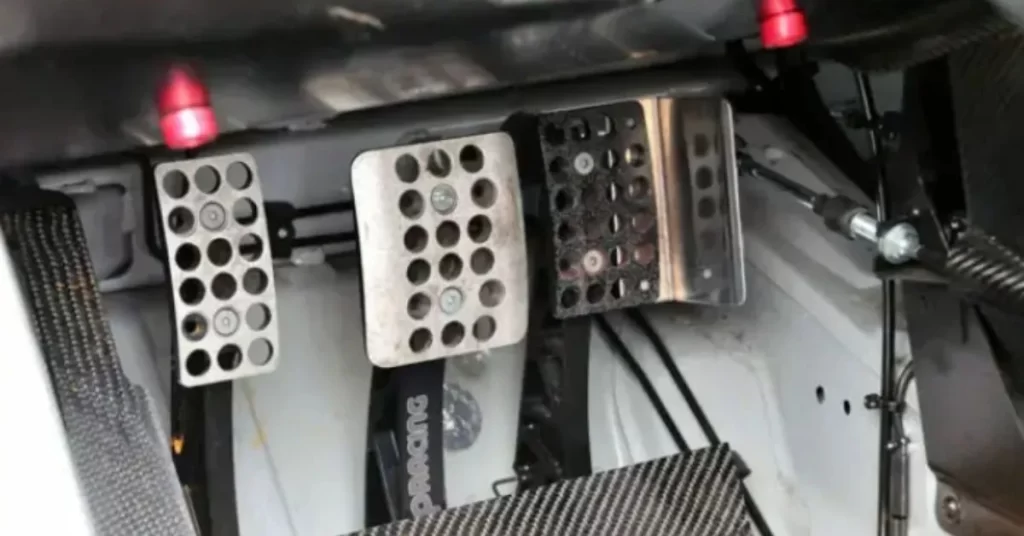Brake Pedal Goes To Floor But No Leaks: [ 6 Reasons and Fix ]
When your brake pedal goes to the floor, it can be a frustrating and potentially dangerous situation if you don’t understand why it is happening. Without internal pressure, braking is much harder than normal and requires additional effort from the driver to get the vehicle to stop in time for intersections or other hazards. The lack of pressurization in the brake system can be caused by various factors and understanding what these are might help you remain safe when driving.
Brake pedal going to the floor? Check for air leaks, low fluid, worn pads, failing cylinders or calipers, line contamination, frozen wheel cylinders, or parking brake issues. Knowing these brake failure points can save you money on repairs later. Get your brakes checked by a qualified mechanic if you experience sudden drops or failures. Dig into and learn more about it.
6 Cusses Brake Pedal Goes to Floor When Engine Running

Why the brake pedal goes to the floor when the engine running? it can indicate a problem with your brakes. There are several possible causes for this issue, including low brake fluid levels, the air in the lines, a worn or damaged master cylinder or caliper piston, a seized caliper, faulty brake lines, and an ABS module failure.
1. Lack of Brake Fluid
A lack of brake fluid is a common cause of a brake pedal going to the floor but no leaks. This can happen due to either a leak within the system or simply not having enough fluid in the system, which can be caused by neglecting regular brake maintenance. If you suspect your vehicle has a lack of brake fluid, it’s important to check your car’s brake fluid level before attempting to repair any other parts of the system.
2. Worn Brake Pads
Worn brake pads are another common cause of braking system failure. As the brake pads wear down over time, they can cause your brakes to become less effective and eventually fail completely. This is why it’s important to make sure your brake pads are regularly checked and replaced when necessary. brake pedal goes to the floor but the fluid is full is another issue.
3. Failing Cylinders or Calipers
If your brake pedal goes to the floor and there are no obvious leaks, it could be caused by failing cylinders or calipers. This is a common issue in vehicles with hydraulic brakes, as the pistons can become stuck, causing the brakes to lose their effectiveness. It’s important to have these parts inspected and repaired as soon as possible to ensure the safety of your vehicle.
4. Line Contamination
Brake lines can also become contaminated with moisture or dirt, causing a drop in pressure and a brake pedal that goes to the floor without any leaks. This is usually caused by an improper brake line flush, which should be done every few years to ensure optimal performance from your braking system.
5. Frozen Wheel Cylinders
Another issue that can cause a brake pedal to go to the floor but no leaks is a frozen wheel cylinder. This is an issue that only affects drum brakes, as the wheel cylinder can become stuck and unable to release its pressure on the brakes when it’s time to slow down or stop.
6. Parking Brake Issues
Finally, your brake pedal going to the floor but no leaks could be caused by an issue with the parking brake. This can happen if the parking brake is not released completely when you are driving, as it will put additional pressure on the brakes and cause them to not work properly. If you suspect this is the issue, make sure to check and release your parking brake before driving.
How Do You Fix Brake Pedal Going Floor?

If you’re experiencing a brake pedal that goes to the floor when the engine is running, it indicates a potential issue with your braking system. Here are a few steps you can take to troubleshoot and fix this problem:
Check brake fluid level: Start by checking the brake fluid reservoir located under the hood of your vehicle. If the fluid level is significantly low, it can cause the brake pedal to feel soft and go to the floor. Add the appropriate type of brake fluid recommended by your vehicle’s manufacturer to bring the fluid level to the recommended range.
Inspect for leaks: Look for any signs of brake fluid leakage around the master cylinder, brake lines, calipers, or wheel cylinders. Leaks can result in a loss of hydraulic pressure, leading to a soft brake pedal. If you notice any leaks, it’s crucial to address them promptly. Leaking components may need to be repaired or replaced.
Bleed the brakes: Air trapped in the braking system can cause a spongy brake pedal feel. Bleeding the brakes removes air bubbles and ensures proper hydraulic pressure. Follow the specific bleeding procedure outlined in your vehicle’s owner’s manual or consult a professional mechanic for assistance.
Check brake pads and shoes: Worn brake pads or shoes can contribute to a soft brake pedal. Inspect the condition of your brake pads and shoes for signs of excessive wear. If they are worn beyond their recommended thickness, they should be replaced.
Examine the master cylinder: The master cylinder is responsible for generating hydraulic pressure in the braking system. If it is faulty or worn out, it can cause a soft brake pedal. Inspect the master cylinder for any signs of leaks or internal damage. If necessary, the master cylinder may need to be replaced.
Inspect the brake booster: The brake booster assists in amplifying the force applied to the brake pedal. A malfunctioning or faulty brake booster can result in a soft brake pedal feel. Check for any signs of leaks or vacuum-related issues. If the brake booster is faulty, it will likely require replacement.
It’s important to note that diagnosing and repairing brake-related issues can be complex and require specialized knowledge. If you are unsure or uncomfortable performing these steps yourself, it’s advisable to consult a professional mechanic who can properly diagnose and resolve the issue with your brake pedal.
Should I Drive With the Brake Pedal On The Floor?

Driving a car when the brake pedal goes to the floor is highly dangerous and should be avoided at all costs. This symptom can signal that something has gone wrong somewhere in your braking system, leading to an inability to apply an adequate amount of pressure for the vehicle to slow or stop.
It could be anything from a brake fluid leak, air in the brake lines, a faulty booster or even a broken master cylinder. In order to ensure your safety and the safety of those around you, it is important that you visit your repair shop as soon as possible and have them diagnose and fix the problem causing this issue.
The best way to prevent this situation from occurring is by regularly checking up on your brakes and ensuring that everything is in full working order. You should get regular inspections for your car so any potential issues can be identified before they become major problems.
Making sure that you replace any worn-out parts immediately will help to reduce any risks associated with driving with no brakes or partial brakes. If you recognize warning signs such as noises coming from your brakes or pumping pedals when applying light pressure while slowing down, be sure that you take action right away for proper diagnosis and repairs.
Brake Pedal Goes To Floor But No Leaks (FAQs)
When I press the brake pedal after bleeding, the pedal goes to the floor?
After bleeding your brakes, if you notice your brake pedal going to the floor, there is a good chance that the brake line has been cut. This can happen when someone tries to bleed the brakes while the car is in motion or when the car has been in an accident, and the brake lines have been damaged. There will be no pressure keeping the brake line from leaking when the brake pedal is pushed to the floor.
What causes a hard brake pedal?
Various issues can cause hard brake pedals, but the most common culprit is a faulty brake line. If the line goes bad, it can cause the pedal to become hard and stop working altogether. In some cases, a hard brake pedal may just result from a worn or dirty brake pad. If you notice a hard brake pedal and it’s not causing any leaks or stopping your car, it may be time to have the pedal replaced.
Why does my brake pedal go to the floor when I start my car?
A faulty brake pedal assembly may cause your brake pedal to go down when you start the car. The brake pedal assembly includes the brake pedal, caliper, and brake line. These components can malfunction if any of them are defective, resulting in the brake pedal going to the floor. In some cases, a faulty brake line may cause the pedal to go to the floor because it can leak fluid and cause the pedal to stick. Your car should be inspected by a mechanic if the brake pedal goes to the floor when you start it.
How do you know if the master cylinder is bad?
If you notice that your brake pedal goes to the floor, but there are no leaks, your master cylinder may be bad. To test the master cylinder, you will need to remove the caliper. Remove the brake hose from the caliper and connect it to a water hose. Pump the water until the brake pedal goes to the floor. If the master cylinder is bad, the pedal will go to the floor even without water pressure.
Conclusion
If you experience a brake pedal going to the floor with no leaks, it is important to get your car inspected by a professional mechanic. There are several reasons why this could be happening, and a professional can help diagnose the issue. Common reasons for this issue include faulty brake lines, worn or dirty brake pads, or a malfunctioning master cylinder or brake booster. Be sure to get your car inspected right away to prevent any further issues with your brake system.
